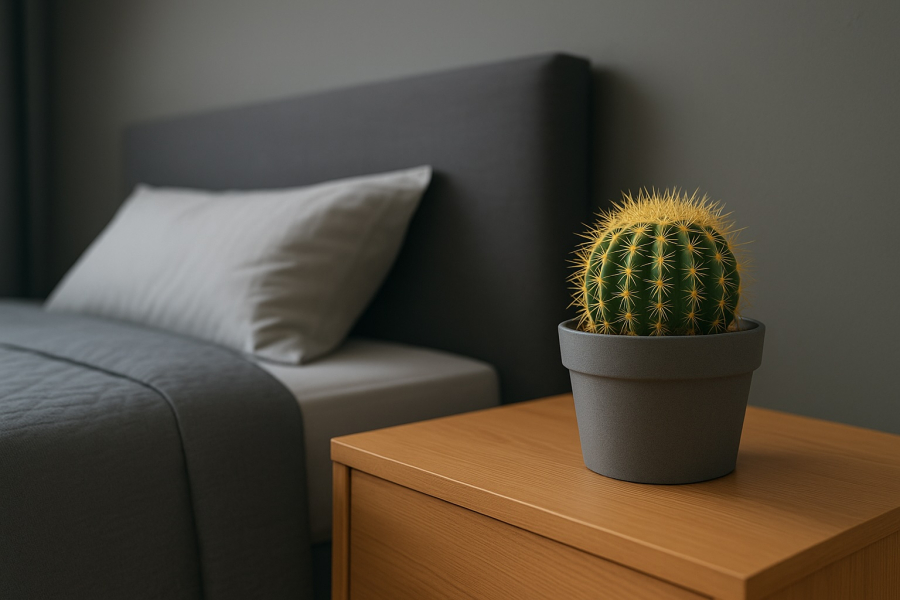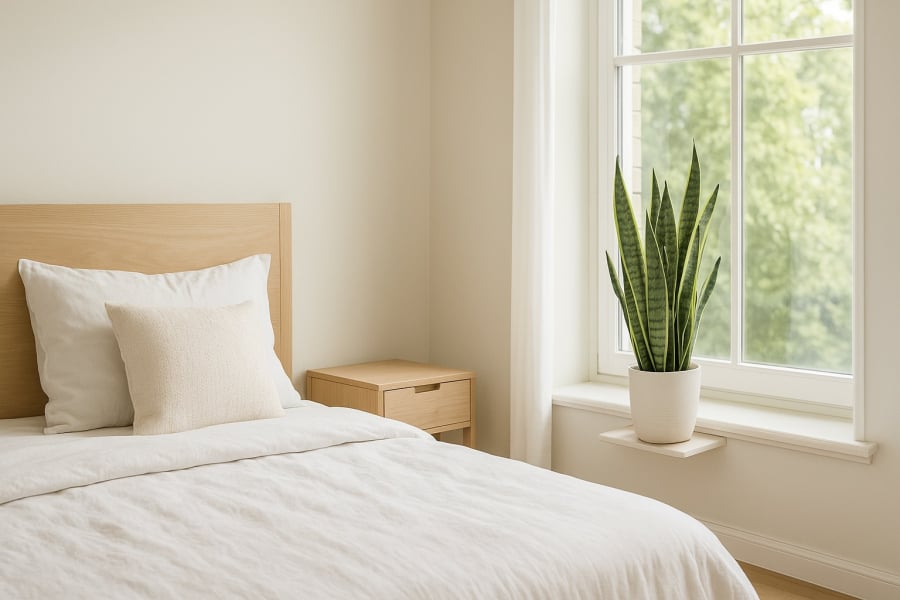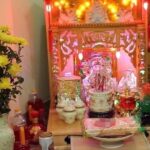Houseplants in the Bedroom: More Harm than Good?
Many people believe that having plants in the bedroom will help purify the air and create a sense of closeness to nature. In reality, while some plants do have air-purifying capabilities, such as snake plants, aloe vera, and ferns, not all of them bring benefits.
According to architect Huynh Xuan Hai (Kien Thiet Viet Design – Construction and Training Joint Stock Company): “Biologically, at night, plants will stop photosynthesis and switch to respiration, releasing CO₂. If you put too many plants in an enclosed space like a bedroom, it can cause a lack of oxygen, difficulty breathing, and insomnia.”
Moreover, in feng shui, houseplants in the bedroom can also bring “yang” energy, which opposes the necessary stillness of a resting space.
Plants to Avoid in the Bedroom
Cactus – Thorny and Sharp Chi
While cacti are easy to care for and have a unique beauty, they carry very strong sharp chi in feng shui. The sharp spines symbolize aggression and disrupt the harmony in the family.
Especially if placed near the bed, the negative energy from the plant can affect the relationship between couples and cause psychological instability.
Feng shui expert Nguyen Hoang once shared on Vietnamnet: “Cacti should not be placed in the bedroom or living room, as they can cause a sense of insecurity and obstacles in life.”

Money Tree – “Wealth Tree” Turns into a Risk
The money tree is considered a symbol of wealth, but many people make the mistake of placing this plant in the bedroom.
Money tree leaves contain mild toxins (calcium oxalate), which can cause irritation if touched or ingested, especially dangerous for children or pets.
Moreover, according to feng shui beliefs, the money tree should be placed in an area with strong energy flow, such as the living room or foyer – where positive energy enters the house. Placing it in the wrong place can block financial luck.
Night-Blooming Jasmine – Fragrant Flowers Cause Insomnia
This romantic-looking flower with its strong fragrance is often favored, but its potent scent at night can cause insomnia, headaches, and even high blood pressure.
Neurologists advise that people with cardiovascular conditions or allergies should avoid strongly scented plants in enclosed spaces.
Toxic Plants – A Hidden Danger
Some ornamental plants like azaleas, oleanders, and golden rain trees contain natural toxins that can cause poisoning if ingested or touched.
According to Dr. Nguyen Thi Nga (Tropical Biology Institute): “Toxic plants should not be grown indoors, especially in the bedroom, where contact is close and frequent. The risk of accidental ingestion is very high for children.”
So, Which Plants are Suitable for the Bedroom?
Not all plants are harmful. Some are actually perfect for resting spaces due to their air-purifying abilities and oxygen release at night.
Suggested “safe” plants for the bedroom:
- Snake Plant: Increases oxygen levels and requires little light.
- Aloe Vera: Cleanses the air and is easy to grow.
- Spider Plant: Helps reduce toxins in the air such as formaldehyde.
However, only place 1-2 small plants in the bedroom, avoiding turning it into a mini garden.

Tips for Choosing Bedroom Plants
- Avoid plants with strong scents or sharp leaves.
- Always check for allergenic and toxic properties, especially if there are children or pets.
- Ensure good ventilation and don’t place plants too close to the bed.
- Regularly clean the leaves and pots to prevent mold and insects.
Conclusion: Choose Wisely for a Good Night’s Sleep and Prosperity
Houseplants can be a “health companion” and enhance feng shui when chosen and arranged correctly. Conversely, placing the wrong plants in the bedroom can not only disrupt sleep but also affect the overall family luck.
Be a wise consumer – don’t let a small decorative decision turn into a reason for financial loss and misfortune in your own home.
Information is for reference and contemplation only
The Ancient’s Warning: ‘An Altar Facing These 2 Directions Brings Turmoil to the Family,’ But Which Directions Are These?
In the realm of feng shui, the placement of an altar can have a profound impact on the fortune and blessings bestowed upon a household. It is believed that an ill-positioned altar can disrupt the flow of positive energy, potentially bringing about misfortune and hardship. Thus, it is of utmost importance to heed the principles of feng shui when deciding on the location of an altar within the home.
The Things You Should Never Place on an Ancestral Altar
The ancestral altar is a sacred spiritual corner in the home, a space for offering gratitude and respect to one’s ancestors. According to traditional feng shui, the placement of objects on the altar is of utmost importance, as even a slight misstep can disrupt the harmony of the home and impact family dynamics and fortune.



































